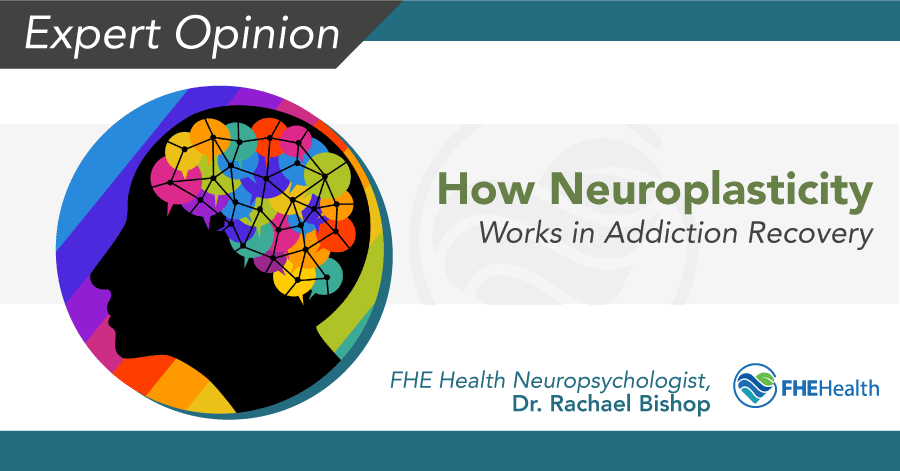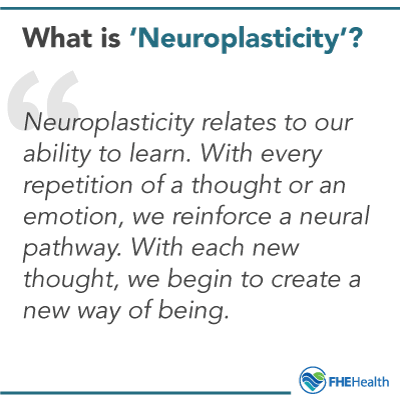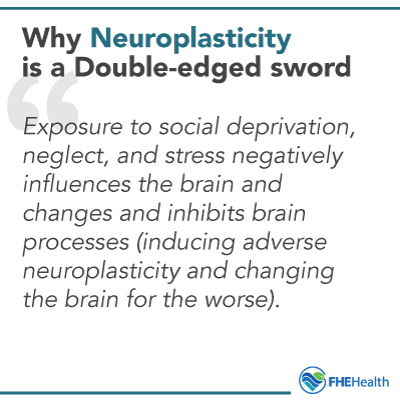
This article has been reviewed for accuracy by our peer review team which includes clinicians and medical professionals. Learn more about our peer review process.
The term “neuroplasticity” is often used to describe the brain’s remarkable ability to learn, heal, and recover in the aftermath of traumatic injuries like drug addiction. Today, thanks to innovations in brain health, this natural and innate capacity for regeneration can be optimized to achieve a faster, more comprehensive recovery from addiction and other mental health conditions. FHE Health has been at the forefront of using these newer, cutting-edge technologies to boost and enhance neuroplasticity—but what really is “brain plasticity,” and why is it relevant to discussions of addiction and recovery?
For help with these and other frequently asked questions, we turned to Dr. Rachael Bishop. Dr. Bishop is a licensed clinical psychologist specializing in neuropsychology and a member of FHE Health’s Neuro Rehab team. In the following Q&A, you’ll hear from Dr. Bishop in her own words. You’ll also gain a deeper understanding and appreciation of your brain’s unique superpower (plasticity) and its role and function both in the development of addiction and the recovery process.
Brain Plasticity – What It Is and Its Benefits
Q: What is neuroplasticity?
 A: “The psychiatrist Norman Doidge once said: ‘Nature has given us a brain that survives in a changing world by changing itself.’ Doidge’s words help capture the essence of neuroplasticity, which at its core is the brain’s ability to change continuously throughout a person’s life and form new connections and pathways and change how the circuits are wired.
A: “The psychiatrist Norman Doidge once said: ‘Nature has given us a brain that survives in a changing world by changing itself.’ Doidge’s words help capture the essence of neuroplasticity, which at its core is the brain’s ability to change continuously throughout a person’s life and form new connections and pathways and change how the circuits are wired.
In other words, [neuroplasticity] relates to our ability to learn. With every repetition of a thought or an emotion, we reinforce a neural pathway. With each new thought, we begin to create a new way of being. Neuroplasticity is the ‘muscle-building’ part of the brain: The things we do often we become stronger at. Connections in the brain are constantly becoming stronger or weaker.
By harnessing neuroplasticity, we can improve what we do and think. Neural pathways are created in your brain based on your habits and behaviors. As you participate in new activities, you are training your brain to create new neural pathways.
Q: What are the benefits of neuroplasticity?
A: Without neuroplasticity, our brains would not be able to develop from babies to adults. Neuroplasticity allows neurons to compensate for disease and injury, and adjust their activity in response to new experiences, and changes in environment, behavior, thinking, and emotions. Neuroplasticity allows us to learn new things, recover from injuries, increase cognitive abilities (such as memory), boost brain fitness, and strengthen areas and connections/communication between areas.
Neuroplasticity and Addiction
Q: What’s the role of neuroplasticity with respect to substance abuse and the development of drug and alcohol addictions?
A: Neuroplasticity is a double-edged sword. Neuroplasticity following repeated drug use leads to more habitual and more compulsive drug/alcohol use. Neural pathways are strengthened if they are important to us and reinforced as we practice or repeat them. Pathways that are ignored may be “pruned” if unused.
When addiction occurs, the brain’s reward pathways are hijacked by the substance use. They overstimulate neural pathways in the brain’s reward center and create a “superhighway” to the drug of choice. But it is possible to create new neural pathways that bypass the ones corrupted by substance abuse. In conjunction with counseling and healthy living behaviors, training in neuroplasticity can help the brain learn to find pleasure in healthy lifestyle choices.
Neuroplasticity and Addiction Recovery
Q: How does neuroplasticity work in addiction recovery?
 A: By changing our existing brain activity, we can make healthy behaviors and positive emotions easier to access. We know that the brain is malleable, neuroplastic, and influenced by one’s social environment. This means therapeutic and other interventions can enhance mental health functioning and recovery.
A: By changing our existing brain activity, we can make healthy behaviors and positive emotions easier to access. We know that the brain is malleable, neuroplastic, and influenced by one’s social environment. This means therapeutic and other interventions can enhance mental health functioning and recovery.
Enriching one’s environment increases neuronal connections and neuroplasticity. Remember again, though, that neuroplasticity is a double-edged sword. Exposure to social deprivation, neglect, and stress negatively influences the brain and changes and inhibits brain processes (inducing adverse neuroplasticity and changing the brain for the worse).
Supportive and enriched social environments can lead to adaptive neuroplasticity, on the other hand. The principles of neuroplasticity underlie many cognitive behavioral interventions—restoring and enhancing neural connections through repeated practice of cognitive exercises in a supportive social environment. In terms of mental health, neuroplasticity means that the brain can become happier, healthier, and better adjusted in the face of life stressors and underlying mental health symptoms.
How Neuro Rehab Works with Neuroplasticity to Boost Recovery
Q: How does neuro rehab boost neuroplasticity?
A: Neurotherapy induces neuroplasticity—it puts the brain in a malleable, easy-to-train state. Neurotherapy can pull the brain out of its habitual pattern or state, which may be a “stuck” state or a maladaptive pattern that in turn leads to different behavioral and emotional symptoms of that dysregulation. Then the brain’s natural propensity for self-regulation, or self-balancing, kicks in. Neurotherapy is how the dysregulated brain learns to correct itself, make new connections, and encourage better communication between its different regions.
Neuroplasticity Exercises for Addiction
Q: Are there specific neuro rehab and/or other exercises that are especially helpful?
A: There are many activities that one can engage in to encourage neuroplasticity to occur. Yoga, exercise, and meditation can all promote neuroplasticity. Practicing a novel task (learning) can also give way to neuroplasticity. Other examples include making music, using the “wrong” hand, traveling, taking a walk through a new neighborhood, going for a hike, and making art. Proper nutrition is also important.
As previously mentioned, neurotherapy induces neuroplasticity. After a neuro session, neuroplasticity continues for approximately 90 minutes. This is the best time for therapeutic work. During this window, a person is more likely to retain information and learn faster.
Engage in any of the activities listed above to optimize the neuro benefits. Practice coping skills, relaxation skills, and stress management skills. Change negative thinking. Practice being honest. Practice and repetition are key. After all, the brain is a muscle and the more you use it and practice, the stronger it becomes. Pathways get stronger with repetition until the behavior is the new normal. Every time you learn something new, you are harnessing the power of neuroplasticity.






